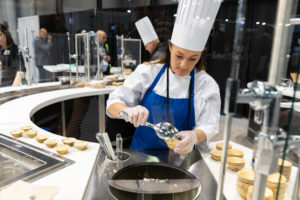by Kevin Banas
CHICAGO – Since March 2020, there have been no shortage of prognosticators telling us that after COVID-19, things will never be the same. Or alternately, some tell us that things will get right back to normal, just as soon as we straighten out our vaccine program. As in most cases, the truth lies somewhere in the middle.
Faced with mandated closures, extreme unemployment, bankruptcies, and most recently, a staffing shortage stymieing reopening efforts, the hospitality industry has had to embrace disruptive operational changes in a fashion I haven’t seen in 20 years. Hotels are a particularly fascinating example.
 Your average hotel breakfast buffet can expect to capture business from up to 90% of the departing guests in the morning. The availability of a breakfast buffet is perceived as an added value to guests, who appreciate the all-you-can-eat option, as well as not having to cart luggage to a third destination between leaving the hotel for an airport or a business meeting.
Your average hotel breakfast buffet can expect to capture business from up to 90% of the departing guests in the morning. The availability of a breakfast buffet is perceived as an added value to guests, who appreciate the all-you-can-eat option, as well as not having to cart luggage to a third destination between leaving the hotel for an airport or a business meeting.
Even before the pandemic, buffets required careful management to follow food safety guidelines, and in early 2020, many were shuttered—even in Las Vegas hotels, where buffets can be hallowed ground to some guests. This precious floor space was sacrificed to offer social distancing and sanitation stations. Meanwhile, food service venues began offering expanded take-out or grab-n-go options.
Is this what the future of hotel food service will look like forever? I can say with absolute certainty it will not. Food service in a hotel, like food service in more humble restaurants and bars, operates on thin margins. For many venues, the food service program is less about selling a meal and more about making the hotel as broadly appealing to guests as possible. For these reasons, programs must be as responsive to consumer demands as possible, and we have seen empirically that consumers want to go back to the way things were.
We had a bit of a false start to reopening, when new vaccination rates were high and nobody had yet heard of a Delta variant. We may have been rudely disabused of this sense of optimism by successive waves of Corona Virus. However, the explosion in travel and hotel bookings just a few short weeks ago, as well as insatiable demand for employees in the hospitality sector, amply demonstrate America’s pent-up desire for leisure and recreation.
 The challenge now faced by hotels will be offering guests a sense of safety (and absolutely making sure that safety is not an empty promise). Operators will feel pressure from guests to return to the services and amenities they treasured before the pandemic, and pressure from ownership to maximize patronage while people rediscover their love of going out.
The challenge now faced by hotels will be offering guests a sense of safety (and absolutely making sure that safety is not an empty promise). Operators will feel pressure from guests to return to the services and amenities they treasured before the pandemic, and pressure from ownership to maximize patronage while people rediscover their love of going out.
The successful ones will keep the practices adopted during the pandemic that added safety and value. Buffets will reopen, and seating plans may encounter a day in the not-too-distant future where every possible square foot of a dining room is in service to seating. But there is still room for sanitation stations, expanded take-out options, and disposable glove dispenses at self-service stations. An experienced food service consultant can assist your team in identifying opportunities to keep your guests safe while providing an excellent experience in your facilities.
The task isn’t as daunting as it seems. The truth is our guests’ safety has always been in our hands. The average American almost certainly trusts their lives to the competence of a chef much more often than any politician. A quick poll of some of my friends showed they could each name about three foodborne illnesses they might catch in a restaurant off the tops of their heads. I can easily name 12. Someday, hopefully soon, COVID-19 will be a manageable illness, and we will keep our guests safe from it via proper sanitation and respectful precaution.
Kevin Banas is project manager at CINI • LITTLE INTERNATIONAL, INC., Chicago.
